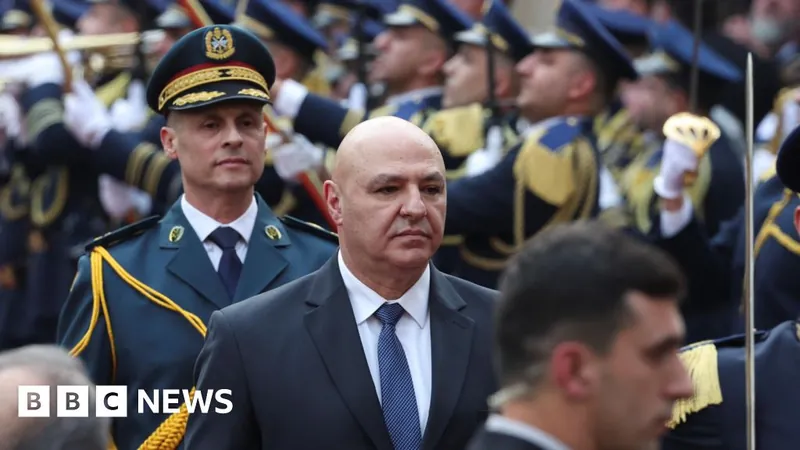
Lebanon's Army Chief Joseph Aoun Elected President: A New Dawn Amidst Political Turmoil
2025-01-09
Author: Jacob
Introduction
In a significant move that marks the end of a prolonged power vacuum, the Lebanese parliament has officially elected Joseph Aoun, the country's army chief, as the new president. This election comes after a staggering two-year hiatus without a president, which has exacerbated the nation’s political instability.
Political Support and Rivalry
Aoun's election is particularly notable as his candidacy is supported by several influential political parties across Lebanon, as well as international heavyweights like the United States, France, and Saudi Arabia. Interestingly, Aoun's rival, Suleiman Frangieh, who was favored by Hezbollah—the powerful Shia militia backed by Iran—decided to withdraw from the presidential race just before the vote, endorsing Aoun as the candidate capable of preserving the integrity of the presidency.
Inaugural Address
His election follows a six-week ceasefire that concluded hostilities between Hezbollah and Israel, a conflict that left the Shia group considerably weakened and devastated numerous areas under its control. In his inaugural address to lawmakers, Aoun declared this election as the start of a "new phase in Lebanon's history."
Key Objectives of the New Presidency
The new president, who is 60, made it clear that one of his primary objectives during his six-year term will focus on ensuring that the Lebanese state reclaims the "exclusive right to bear arms," addressing the contentious issue of Hezbollah's significant military presence which contradicts a UN Security Council resolution established after the last major conflict in 2006.
Reconstruction and Reforms
Aoun also highlighted the urgent need to address the extensive damage inflicted by what he referred to as “Israeli aggression” during the recent war, estimating reconstruction costs could reach an alarming $8.5 billion. Moreover, he emphasized the necessity for sweeping political and economic reforms in a country beleaguered by a severe economic depression, one of the worst of its kind in recent history, along with the devastating Beirut port explosion of 2020 that resulted in over 200 fatalities.
Ceremonial Powers and Political Context
Although the presidency in Lebanon holds mostly ceremonial powers—primarily related to signing legislation and consulting political figures for appointing a prime minister—Aoun's role may prove vital in steering Lebanon through treacherous waters. There has been no functioning government since the parliamentary elections held in May 2022, leading to significant political paralysis.
Election Outcome and Reactions
As the voting unfolded, Aoun received sufficient support, garnering 99 votes in the second round—a far cry from the required two-thirds majority but ultimately sufficing due to Hezbollah's endorsement. Celebrations erupted across the nation following the announcement, with media capturing the jubilant atmosphere as Aoun arrived to take the oath of office.
International Reactions
Remarks from international figures followed suit; UN Special Coordinator for Lebanon, Jeanine Hennis-Plasschaert, described the election as a "long-awaited first step" toward restoring the nation’s dysfunctional political landscape, emphasizing the pressing need for the formation of a government to address Lebanon’s monumental challenges.
Conclusion
As Lebanon stands at this pivotal moment, the world watches closely, eager to see whether Joseph Aoun can indeed navigate the treacherous waters of Lebanese politics and lead his country toward stability and renewal. Will he succeed where others have faltered, or is this merely a fleeting dream for a nation in chaos?



 Brasil (PT)
Brasil (PT)
 Canada (EN)
Canada (EN)
 Chile (ES)
Chile (ES)
 Česko (CS)
Česko (CS)
 대한민국 (KO)
대한민국 (KO)
 España (ES)
España (ES)
 France (FR)
France (FR)
 Hong Kong (EN)
Hong Kong (EN)
 Italia (IT)
Italia (IT)
 日本 (JA)
日本 (JA)
 Magyarország (HU)
Magyarország (HU)
 Norge (NO)
Norge (NO)
 Polska (PL)
Polska (PL)
 Schweiz (DE)
Schweiz (DE)
 Singapore (EN)
Singapore (EN)
 Sverige (SV)
Sverige (SV)
 Suomi (FI)
Suomi (FI)
 Türkiye (TR)
Türkiye (TR)
 الإمارات العربية المتحدة (AR)
الإمارات العربية المتحدة (AR)